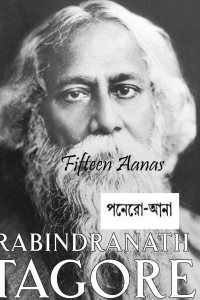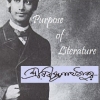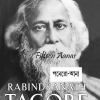
Fifteen Aana
A translation of Rabindranath Tagore's "Ponero Aana"
Anirban Nanda
(This essay, originally titled as “Ponero Aana”, was first published in 1902–03 (Bengali year 1309, month of Magh) in Bangadarshan magazine. Later, it was republished as a book in the essay collection Bichitro Probondho (Miscellaneous Essays))
[Note: In pre-independence era, one Indian rupee was of significant value. So, it was divided into 16 parts. Each part was called one aana. Later, this concept of 16 parts was extended to many aspects and used frequently in Bengali colloquial language. So, 4 aanas mean 25 per cent of the whole; 8 aanas mean 50 per cent or half and so on. In this essay, 15 aanas signifies the majority.]
For a rich person, his garden is bigger than his home. Home is essential for its owner, whereas the garden signifies excess ─ a luxury he can do without. Anything in excess or beyond one’s needs proves the grandeur of wealth. A goat’s horn though small, is enough for its need. But the size and appearance of a stag’s horn overwhelms us. Similarly, a peacock’s grand and colourful tail gives us immense joy. But it is more glorious and beautiful than is needed and thus, makes other short-tailed birds embarrassed of the plainness of their tails.
A person who dedicates himself for the good of the society is undoubtedly an ideal man. But, fortunately, most of the people don’t follow that path. If they had, it would make the human society look like a fruit full of seeds, without any pulp. He who does good for the people is called great. But it is also true that people love an ordinary man because he can dedicate himself fully to the welfare of others. Great people are in a sense confined by their greatness. They reach us through the narrow window of their good deeds. They are bound from all the other sides by their greatness. Only one door is available to reach them. We go to that door and lay our hands, and they provide. On the other hand, an ordinary man is not that useful, he has no such confinements. He is not our saviour or provider, but is just another companion in our journey. We go the great man to earn wisdom and help; then we seek the company of the ordinary man to use those resources.
By the grace of the Almighty, the majority of us are as superfluous as the stag’s horn or the peacock’s tail. The stories of our lives are not worthy to be written and fortunately, after our death, people would not have to beg from door to door for subscription in futile attempts of building stone statues for us.
Very few people remain immortal after their death, thanks to which the world is still habitable. Everyone should not try to become immortal. If all the coaches of a train are reserved, then what will happen to the general passengers? Firstly, great people are like a one-man army, meaning, during their lifetime, they possess a place in hundreds of hearts of both their admirers and critics. Then, they don’t vacate that space even after dying. Far from vacating, many take the advantage of death to extend their domain further and further. The only saving grace for us is that the number of such persons is very less. Otherwise, the common people would not be able to find space to build their huts amid myriad tombstones. Earth is so small that living beings have to fight among themselves for their place. Be it in the land or be it in the heart of men, to occupy more space than average, many people resort to fraudulent and questionable means at the stake of the damnation of both the present and the afterlife. This fight between mortals is a battle between equals, whereas the fight between the living and the dead is very difficult. The demised are beyond all kinds of weaknesses and fragmentations, they are roamers of Elysium. And we mortals are distressed with gravitation and other earthly forces of attractions and repulsions. Hence, we cannot cope up with those demised. This is the reason why God banishes most of deceased to forgotten-land to be forgotten, where there is no dearth of space for anyone. If God wanted to cram petty mortals like us in the dark and confined corners of the big space occupied by immortals, then why has He created the world so bright and beautiful?
How has a person’s heart become so alluring to another person?
Intellectuals criticize us. They say that our lives are wasted. Persuading us, they preach, “Arise. Awake. Work hard. Don’t waste time.”
No doubt that many waste their time by not doing anything; but those who work and fail in the same, not only do they spoil the work, but also waste their time. The world vibrates in their heavy footsteps, and to save this helpless world from their overwhelming endeavours, God said: “I reincarnate in every age.” (Sambhabami yuge yuge.)
Life has become futile. Let it be futile. Most lives are meant to be futile. These fifteen aana's worthless lives prove God’s wealth. We, the worthless, are the innumerable vouchers to establish that His storehouse of creation is not bankrupt. Remember the glory of our Maker when you see our inexhaustible innumerability, our unnecessary superfluity. The way a flute promotes music through its own void, we, the fifteen aanas of the world are announcing the glory of our creator via our futility in the same way. Buddha left family only for us, Christ gave his life for us, sages accepted arduous austerity for us, and saints remained awake only for us.
Life has become waste. Let it be. Because it should be. Failure is a success. When a river flows, all of its water is not used for bathing and drinking and irrigating lands. Most of its water just maintains the flow. Only keeping the flow and doing nothing else has enormous significance. The river-water which we bring in by canals to fill our ponds can be used for bathing, but we do not drink that. The river water which we bring in pots and store in pitchers can be used for drinking, but light and shade cannot dance on it in a festive mood like they do in ponds. Regarding something as success merely for its helpfulness is nothing but miserliness, and considering purpose as the ultimate meaning of everything reflects nothing but meanness.
Let us, we, the ordinary fifteen aanas, not consider ourselves small. We keep the world going. We have a lifetime’s right to men’s hearts. We do not occupy anything, we do not cling on to anything; we go on. All the tunes of the world are sung by us. Only on us, all the light and shade pulsate. We laugh and cry and love, play with our friends unnecessarily, keep talking with our relatives needlessly, and spend most of our days with people all around us aimlessly. Then after getting our sons married with pomp and gaiety and employing them in offices, we leave this world burning in pyres leaving no fame, becoming ashes. We are part and parcel of diverse ups and downs of the waves of this huge world. In our small and silly jokes and laughs, the whole flow of crowd dazzles. In our small talks and murmurs, the whole society resounds.
What we call as futile, the majority of nature is that. The majority of the sun rays get lost in space, a blossom of a tree seldom survives till it becomes fruit. But, in that case, let the owner look after his accounts. We cannot judge whether expenses are a waste without checking the Creator’s ledger. Similarly, we majority are of no use other than giving companionship and momentum to each other. That’s why without condemning ourselves and others, without becoming restless, if we get peace with ease in delightful laughs and cheerful songs, in a fameless end; then in that aimlessness, we properly fulfil the true aim of our life.
If the Maker has created me as a futile being, then I am grateful. But, if due to advisors’ persuasion I think I must do good to others, I must become useful to them, then the awful mess that results will be my own doing. I have to answer for that. Everyone doesn’t come to the world to benefit others; hence, there is no shame in not being able to do that. What if I do not fancy going to save China as a missionary? Not leaving my country, if you call my spending days hunting foxes, betting on horseracing a failure; that surely is not as nail-biting a disaster as trying to save China would cause.
Not all the grass becomes paddy. The majority of the world is grass, only selected few become paddy. But may the grass not mourn over its own natural fruitlessness. May it remember that it is covering the dry dust by its greenery; it is softening the scorching heat of the sun by its ever-complacent tenderness. I think, among grasses, kush grass had forced itself to become paddy. It didn’t want to remain mere grass. It had found thrill and excitement in trying to become useful by engaging in others’ lives. But, at the end, it still remained mere grass, not paddy. Overall, it can be said that this kind of acute urge to become useful to others is not the wish of the Almighty. The uncelebrated, soft and tender futility of grass is far better than this.
In short, humans are divided into two categories ─ fifteen aanas and the rest one aana. Fifteen aanas are calm and the remaining one aana, restless. Fifteen aanas are inessential and the one aana, absolutely essential. Flammability of air is due to oxygen which is present in a minor proportion whereas the majority of air is inert nitrogen. If the reverse becomes true, the world will burn to ashes. Similarly, when fifteen aanas of the world attempt to become as restless and essential as the remaining one aana, then there can be no good in this world. Then those who are fated to be doomed must prepare for Doomsday.
THE END
About the Author







Comments